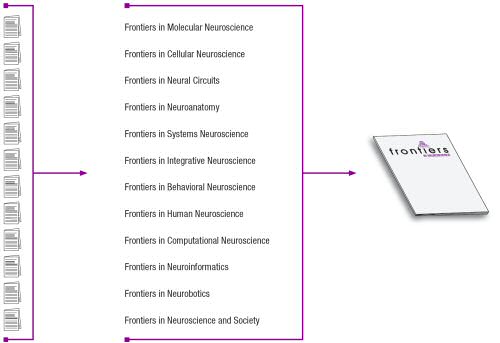Main Menu
Welcome
Let's set the scene so that it becomes clear why FiN is such a GreatNewThing(TM). The current model of science publishing entails that it isn't all that important what you publish, but where (i.e., in what journal) you publish. Besides historical reasons for this irrational way of assessing scientific discoveries, one major contributing factor is a negotiable, irreproducible and statistically unsound journal ranking system. At the same time, there are about 24,000 scientific journals putting out about 2.5 million scientific papers every year. Obviously, reading all of them for peer-assessment is out of the question. I guess it now becomes clear why everybody is really looking for new ways of handling the assessment of science today. There have been general discussions on how scientists can build a reputation with today's new technologies, or what factors should count in post-publication paper assessment.
Frontiers in Neuroscience implements some of these ideas in their new tiered journal system:

In this system, every paper gets published in a specialty journal. The peer-review process is interactive, which means you get to discuss the major points with the reviewers, which makes things so much easier on everybody. The system relies on everybody reading and downloading articles to be registered on the site with as much detail as possible (see my profile). Your activities on the site get rewards: as an author, if your papers accumulate enough clicks, downloads, ratings etc. they can get promoted to the next tier journal. As a reviewer, you get credits for your reviews, prizes for promoted articles you reviewed, etc. All these activities may eventually promote you from review editor to associate editor. Go and read their brochure for all the details on this exciting new development.
BTW, this sort evaluation system, where reviewers and authors get credit and awards for their efforts and where these efforts get displayed on the profile of the researcher is exactly the kind of functionality I've been calling for at PLoS One. Frontiers is definitely taking a step in the right direction. It's this sort of continuous evalutation not only of your research efforts, but also of your other scientific activities which will show what kind of researcher you are and if you fit for the job/grant/other you are applying for.
Posted on Tuesday 19 August 2008 - 15:58:26 comment: 0
{TAGS}
{TAGS}
You must be logged in to make comments on this site - please log in, or if you are not registered click here to signup
Render time: 0.0729 sec, 0.0063 of that for queries.





